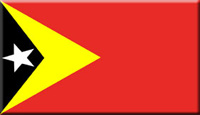East Timor faces humanitarian crisis; thousands fleeing

When the labor pains come, "I don't know where I'll go. I should be at home," said the distraught housewife, who fled her home in East Timor's capital, Dili, when violence began last month.
Like thousands of others, Gonzales and her family have sought refuge in community centers and churches from weeks of uncertainty, fighting between government and rebel troops and open gang warfare in the streets.
Thousands of others have fled the city altogether to stay with relatives in outlying villages or in camps.
More than 70,000 refugees are staying in makeshift camps surrounding the seaside capital and 30,000 others are in camps outside the city, said Kym Smithies, a spokeswoman for a group of 30 aid agencies working in East Timor.
Some 3,000 women in the camps are pregnant, she said.
At Don Bosco, a Roman Catholic community center in Dili, families huddle together under plastic sheeting shielding them from the tropical sun. The sound of children coughing can be heard throughout the camp, though aid groups say there is no sign of any outbreak of serious disease.
Smithies said at least 13,000 people are staying at the center - the largest camp in the city.
Some people venture out into the city during the day to collect firewood for cooking fires. They are too scared to leave the camp at night.
The group she represents includes several U.N. bodies, the International Organization for Migration, the International Red Cross and other agencies.
Subscribe to Pravda.Ru Telegram channel, Facebook, RSS!





